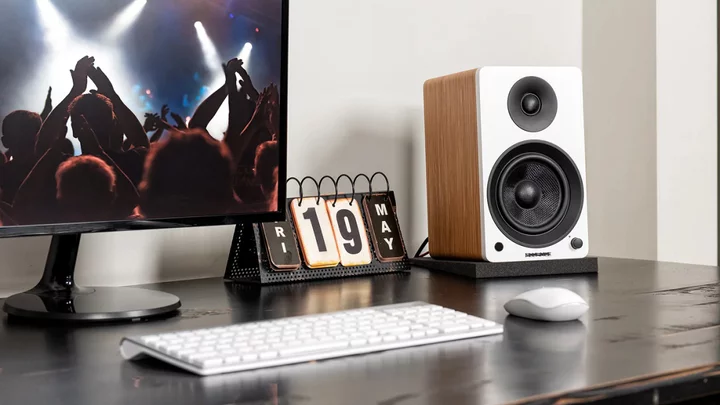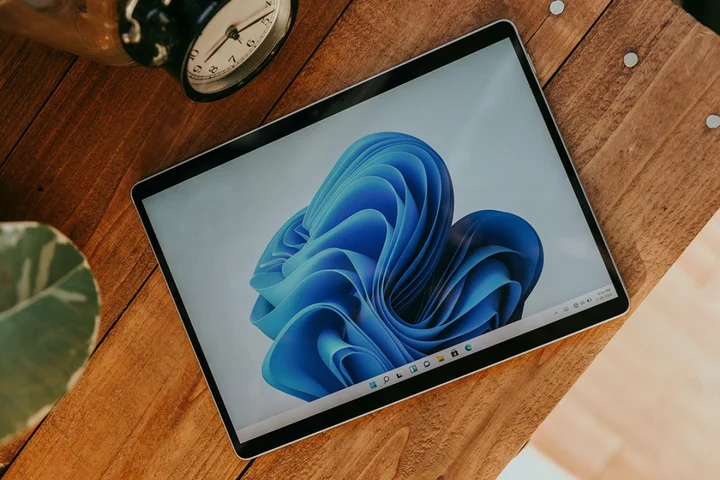Few things in life are as enjoyable as high-fidelity music. But as you've probably noticed, that music only sounds as good as the system it plays through. Most PCs and Macs don't come with high-quality speakers—and that's to say nothing of the tiny built-in drivers in most laptops. Even if you're on a tight budget, low-cost speakers can improve your listening experience in a big way.
Below, we list our current top picks for wired and wireless computer speakers, whether you’re looking for something stylish, a subwoofer, or a system for mixing audio. Make sure to read to the end for our tips to help you find the best speaker system for your needs.
What Are the Best Speakers for a Desktop Computer or Laptop?
To choose the best speakers for your computer, you first need to understand the most common types: stereo, 2.1, and surround sound speakers.
Stereo speakers consist of only a left and a right speaker, 2.1 refers to a pair of speakers with a subwoofer, and surround sound ideally involves at least five speakers plus a subwoofer. The role of the subwoofer is to cover deep bass frequencies, generally below 100Hz. A solid sub at a reasonable volume can add rumble to film explosions and depth to kick drums, bass guitars, analog synths, orchestras, and more. Some stereo speaker pairs, however, sound great even without a subwoofer, primarily because their woofers (the drivers dedicated to low-mid and low frequencies below 1kHz) are perfectly capable of handling the bass response.
The vast majority of desktop speakers are stereo pairs. Some have accompanying subwoofers, but you won't likely have more than two or three satellites to deal with. Some serious gamers and cinephiles might want to look for a 5.1-channel (or higher) surround sound system, but the extra cost and inconvenience of placing all those speakers around the room isn't worth it for most users.
There are also one-piece solutions (or one-piece with a subwoofer) that offer plenty of power, but they don't provide the stereo imaging you get from multiple satellites. You might even be able to plug portable Bluetooth speakers into your PC as a one-piece solution if they have a 3.5mm audio input or a USB connection.
What Are the Best Bookshelf Speakers?
The term bookshelf speaker generally describes any speaker that can comfortably fit on a bookshelf and is part of a stereo pair or other multiple-speaker setup. However, especially among audiophiles, it has a much more important implication: Bookshelf speakers are small, unpowered stereo speakers. That unpowered part is a very big detail that should please anyone who knows how to set up a high-end home sound system and might frustrate everyone else.
All speakers require power to run. Without electricity flowing into the drivers, a speaker is just a box with some weird paper and metal bits in it. The vast majority of computer speakers, along with all Bluetooth and wireless models, are powered, or "active." That means a built-in amplifier takes the signal it receives and feeds enough power into the drivers to reproduce it. This is handy because it means you don't need to get a separate amp to drive your speakers; you just plug them into your computer and they work.
Bookshelf speakers, on the other hand, typically work passively and require a separate amp. That means whatever music you want to hear through them needs to be put through the amp first, which then connects to the speakers. They're more expensive and take up more space once you finish the setup, but the benefit is much more powerful and clearer sound.
There are a few exceptions in the form of active studio monitors. Here, the distinction between a bookshelf speaker and a computer speaker blurs. Basically, some powered speakers are designed for high-end audiophile use, like home studio mastering. They don't need an amp, but generally sound better and cost more than most consumer-level computer speakers. Of course, you can use them with a computer just as easily, since it's still just a matter of plugging the speakers into your sound card.
We primarily test active speakers that have built-in amps. That covers the vast majority of computer speakers, wireless speakers, and consumer-oriented home theater speakers and soundbars.
How Do I Connect Speakers to My Computer?
You might not think much about extra features when it comes to PC speakers, but there are some things to consider. Do the speakers include bass and treble controls so you can tailor the sound to your tastes? How about a mute button? Or a remote control?
High-quality sound and robust extra features are not necessarily mutually exclusive; it depends on the set. If your PC has a limited number of USB ports, you should probably go with the more common 3.5mm audio output connector, though USB speakers sometimes come with extra features or even software that enables special functions. And, if your PC has Bluetooth, you can stream music wirelessly to any speaker that accepts it (which is the vast majority of portable speakers and a large number of desktop speakers). You may have to deal with potential codec restrictions, however.
How you plan to use your speakers can also help you determine the best option. You probably don't need a mammoth subwoofer if you're listening at work—small speakers with decent clarity might be the wisest choice, particularly if you're just using them to watch YouTube videos or listen to internet radio streams. For home, maybe you want larger or more stylish speakers, and the ability to blast them without distortion (especially if your PC is your main music source). For more, see our guide on how to set up your speakers.
How to Pick Speakers for Recording Music
Are you a musician and want to record and mix music at home? Look for a pair of active studio monitor speakers that represent your work as accurately as possible and don't color the sound in a way that hides flaws in a recording that could show up on other listeners' systems. Audioengine does this nicely. And be sure to pair them with a good microphone.









